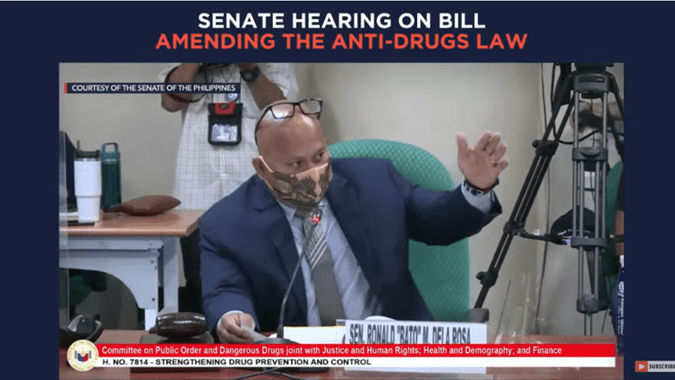
The Senate Committee on Public Order and Dangerous Drugs jointly with the Committees on Justice and Human Rights, Health and Demography and Finance, held a public hearing on House Bill 7814 seeking to amend R.A. 9165 or the Dangerous Drugs Act. Among the resource persons who gave their positions on the proposed amendments were the Commission on Human Rights, the Philippine National Police, the Philippine Drug Enforcement Agency, the Department of Justice, Department of Interior and Local Government, Department of Health, the Dangerous Drugs Board, the Board of Corrections and the civil society representative No Box Transitions Foundation, Inc.
The event underlined the urgency of reviewing R.A. 9165 towards a more comprehensive, coherent and effective approach to the drugs issue in the country.
In Defense of Human Rights and Dignity Movement welcomes the opportunity provided by the draft legislation to debate on the issue of drugs, but laments that provisions which violate Constitutional guarantees on the right to life, due process and equal protection of the law, remain in House Bill 7814.
The reintroduction of death penalty violates the Second Optional Protocol of the International Covenant on Civil and Political Rights (ICCPR), the UN Convention on the Rights of the Child (UN CRC) to which the Philippines is a State party, the Philippine Constitution’s Bill of Rights as well as international treaties on drugs and narcotics. iDEFEND urges its deletion from the bill.
The United Nations Office on Drugs and Crime (UNODC) cited that “the three international drug control conventions, which form the foundation of the global drug control system that has been agreed by nearly every country in the world, cannot be used to justify the use of the death penalty for drug-related offences alone. Application of the death penalty may also impede international cooperation to fight drug trafficking, as there are national laws that do not allow the exchange of information and extradition with countries which may impose capital punishment for the offences concerned. The dangers posed by illicitly-trafficked drugs are evident and lives are at stake. But use of the death penalty cannot provide durable solutions or protect people.”[i]
Moreover, reimposing death penalty will endanger Filipino children and youth into further victimization as they are more prone to being exploited and abused by syndicates and adults in the commission of the crime. Legalizing state violence through the reimposition of death penalty will likely expose the children in an environment that is detrimental to their growth and development.
A number of presumptions violate due process, and put at grave risk, community-based programs and health-oriented services by both government and non-government organizations. Criminal liability is presumed when “any person found or is present within the immediate vicinity of the area of sale, trading, marketing, dispensation, delivery or distribution… is deemed to have been involved in the illegal activity”; likewise, the bill presumes that “premises are used for the purpose of the administration, smoking or consumption of dangerous drug by a human being, if “any paraphernalia or instrument for the use or administration of any dangerous drug is found” in therein.
The presumption of guilt found in several sections of the bill is already a death sentence for children who are often used as proxy or pawns in drug operations or in “palit ulo/ palit-puri schemes” employed by seemingly unscrupulous law enforcement officers as documented and reported over the course of the war on drugs campaign. Children who are living with persons who use drugs are also placed in a precarious situation because by their mere presence or proximity in the place where the prohibited act is taking place, they are already presumed to be involved in the activity.[ii] iDEFEND supports the joint civil society position paper calling for the complete removal of these provisions from House Bill 7814.
Finally, the draft legislation is being deliberated under a policy environment fashioned by the government’s violent war on drugs, which continue to provide the blueprint for these repressive provisions. Legislation which genuinely seek to improve our country’s drug regulatory regime must abandon this highly punitive, violent, corrupt, purely law enforcement framework; it must recognize the social injustices that drive the illegal drug trade and push to institutionalize rights-based governance, evidence driven, health-based paradigms in drug regulations.
Screen grab from: Rappler Youtube
[i] UNODC; Statement attributable to the UNODC spokesperson on the use of the death penalty; June 2019; https://www.unodc.org/unodc/en/press/releases/2019/June/statement-attributable-to-the-unodc-spokesperson-on-the-use-of-the-death-penalty.html
[ii] This is based on the documented cases of children who are deprived of liberty because of the war on drugs





